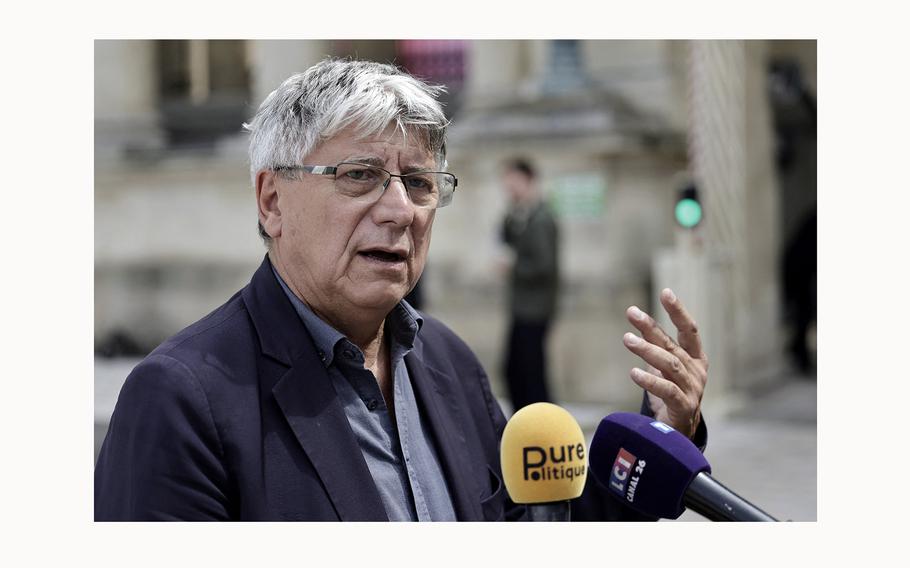
Eric Coquerel, the newly-elected member of the French Parliament, is seen at the National Assembly in Paris on July 2, 2024. (Stephane de Sakutin/AFP via Getty Images/TNS)
French lawmakers reelected a member of the far-left France Unbowed party to head the National Assembly’s powerful finance committee, foiling a plan by President Emmanuel Macron’s allies to team up with the center-right opposition and gain the post.
Eric Coquerel, who held the job in the previous legislature, got 29 votes on the commission, beating Veronique Louwagie, who had the support of her own Republican Right party and Macron’s group, with 26 votes and Jean-Philippe Tanguy of the far-right National Rally with 18, Le Parisien reported Saturday.
The finance committee, traditionally led by a member of an opposition party, has a key role in the adoption of the French budget in Parliament. It also oversees how the government spends public money. The committee can also block legislation if it deems that it puts too much pressure on public finances. Macron’s party tried to choose the opposition that it preferred by teaming up with the center right, Coquerel said.
“I’m all the more proud to say that this attempt was thwarted,” he said in televised comments after the vote. “It is totally contrary to the prevailing spirit: That the chairman of the finance committee should come from the opposition and therefore be the guarantor of control over the budget that was intended.”
Coquerel’s win comes two days after Yael Braun-Pivet, a member of Macron’s party, was reelected as the head of the National Assembly thanks to Republican Right legislators who rallied behind her in the third and final round of the vote. While formally registered as an opposition party in parliament, the Republicans have joined forces with Macron’s bloc in order to face down lawmakers from the far left and the far right.
France was thrown into political disarray in June when Macron dissolved the National Assembly and called a snap election after his party was crushed in a vote for the European Parliament.
The power-sharing deal between Macron’s political group and center-right lawmakers is another sign he may try to cobble together a centrist coalition government that excludes radical parties on the left and right. The deal between two groups that are traditionally rivals helped secure Braun-Pivet’s reelection Thursday.
The snap election fragmented the lower house into three primary groups — the left-wing New Popular Front, which holds the most seats and includes France Unbowed and the center-left Socialists; the centrist Ensemble that is second; and Marine Le Pen’s far-right National Rally in third.
No group holds enough seats to govern on its own, putting the country in the unprecedented situation of having to rely on several parties across the ideological spectrum to form a new government.
The agreement between Macron’s Ensemble and the Republican Right failed to deliver enough votes to elect Louwagie. But each group got National Assembly vice president positions in balloting late Friday night that stretched into Saturday morning.
Details of the agreement have been laid out in discussions between Laurent Wauquiez, the Republican Right leader in the Assembly, and the head of Macron’s group, former Prime Minister Gabriel Attal.
While the Republican Right — the fifth-strongest faction in the assembly — is working with Macron’s bloc to face down lawmakers from both ends of the political spectrum, the main target is now the left, since it won the most seats while Le Pen’s party came in third.
Top jobs in the lower house aren’t directly related to the appointment of a prime minister or the formation of a government, though they could give an indication about which coalitions are able to unite behind a single candidate in sufficient numbers.
Macron is constitutionally empowered to pick a new prime minister and it’s been accepted practice to appoint someone from the biggest group in the National Assembly. As a counterweight, lawmakers can call for confidence votes in the government.
This means choosing a premier with broad enough appeal to stay in place and build majorities on a case-by-case basis to pass legislation.
Despite winning the most seats, the New Popular Front has been unable to propose a candidate for prime minister because the four parties in the alliance can’t agree among themselves who that person should be. The Socialist Party proposed Friday that the deputies from the parties hold a vote by Tuesday at the latest to choose a candidate.
Macron has called for all parties that support the European Union and the rule of law to come together to form a government, in an effort to form a mainstream alliance that would exclude both the far right and the far-left France Unbowed party.
This approach would allow Macron’s government to continue, albeit in a weakened form. Macron has asked Attal to stay on as head of a caretaker government with limited powers.
The deal also grants Republicans some relevance after mounting defeats in the ballot box in recent years. Existential internal discussions in the party that was founded by general Charles de Gaulle and had Nicolas Sarkozy and Jacques Chirac as presidents got worse after its head, Eric Ciotti, rallied behind Le Pen’s far right in this year’s election.
©2024 Bloomberg L.P.
Visit bloomberg.com.
Distributed by Tribune Content Agency, LLC.